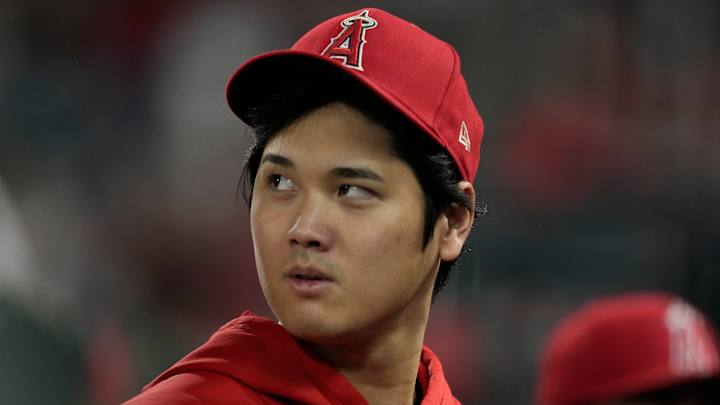Angels End Shohei Ohtani’s Season With Yet Another Example of Incompetency

This weekend very well may have marked the end of Shohei Ohtani’s career with the Angels. It’s hard to argue that it wasn’t fitting.
The team had been silent on his status for nearly two weeks. Ohtani had continued to appear in games as a hitter after being diagnosed with a UCL tear on Aug. 23, an injury that ended his season as a pitcher and carried a strong possibility of surgery, which could have serious ramifications for his upcoming free agency. But he was able to continue his transcendent campaign in the lineup—until he tweaked his right oblique while taking batting practice on Sept. 4. And then came an information vacuum.
The Angels did not place him on the injured list. Yet he did not appear in the lineup for a few days, then for one week, then another. On Friday night, reporters shared that his locker had been cleaned out, and nearly all of his personal items were gone. It had seemed likely for months (if not years) that this would be Ohtani’s last season with the Angels: His chances of re-signing in free agency feel slim after six years without so much as a trip to the playoffs. But it still felt stunning that it might end like this. An empty locker, no announcement or fanfare, a season finished before anyone realized it might really be over.
The Angels finally offered clarity on Saturday. Ohtani would be placed on the 10-day IL due to the oblique injury and would officially miss the rest of the season. He was seen in the dugout that evening for the first time since he disappeared from the lineup, and the team confirmed he would remain with them for the immediate future, at least through the final homestand of the year. Any lingering potential for drama was handled and dismissed.
But it came only after a saga befitting the recent history of the club—messy, anticlimactic, something that might have been straightforward in other hands instead left to fester and complicate and sour.

That felt like perhaps the most apt ending possible to Ohtani’s time with the Angels. How best to describe the last six years in Anaheim? They’ve been marked by bad decisions and bad management, particularly from owner Arte Moreno, who has made it difficult to imagine that anything might get materially better anytime soon. Yet they’ve also been marked by a tremendous amount of bad luck. There is worthwhile, serious work to be done in untangling just how the franchise got to this point. But you could be forgiven for skipping that and simply declaring the team cosmically cursed. It’ll get you to the same place in the end. And it’s perhaps easier to swallow the idea of intractable supernatural darkness than it is to realize a club really may have squandered a pair of generational talents as dazzling as Ohtani and Mike Trout.
Of course, it’s not quite that simple. (It never is.) Trout and Ohtani shared a roster for six years, but it’s not quite right to say they were at the height of their powers at the same time, exactly: Trout’s peak was something like 2012 to ’19 and Ohtani seems to have started in ’21. And the idea of squandering this dual starpower is more complicated, too.
It’s true that the Angels have not had a winning season since ’15. But it feels incorrect to suggest that all the years since have been wasted—a failure of language, perhaps, if not one of imagination. The Angels have tried to build a winning team. They have (quite obviously) not succeeded, and with this kind of failure comes the idea that everything leading them here was clearly, indubitably pointless. The phrase “meaningful baseball” implies winning baseball. But aren’t there other forms of meaning?
The Angels have shown us plenty of material in recent years that could not be found on a ballfield anywhere else—both transcendent feats and breathtakingly stupid innovations in ways to lose. They have frequently been the most interesting show in baseball, often the dumbest, very occasionally the most radiant. The Angels have given fans every reason to be furious lately, along with reasons to contemplate fairness, mortality, faith, philosophy, logic, suffering and punishment. They have not played much in the way of meaningful baseball. But there might not be a team to offer a greater shared understanding of meaning.
It’s nonetheless brutal to see Ohtani’s season end like this. It was so clearly his finest work yet: a more complete performance than either his historic MVP campaign in 2021 or his follow-up in ’22. He is MLB’s leader in OPS (1.066) and OPS+ (183) and still leads the American League in counting stats including home runs, triples and walks, even after missing the last few weeks. He finishes with 10.1 Baseball-Reference WAR, more than anyone has ever accumulated in so few games and very probably enough to remain the league leader through the end of the season. (Just two other players have more than 7.0 bWAR as of Sunday: Mookie Betts at 8.1 and Ronald Acuña, Jr. at 7.6.) He remains the clear favorite for AL MVP. This was a performance worthy of pomp and circumstance. Instead, it ended not with a bang, but with a belated clarifying trip to the injured list.
There’s no better symbol of his time with his Angels.
